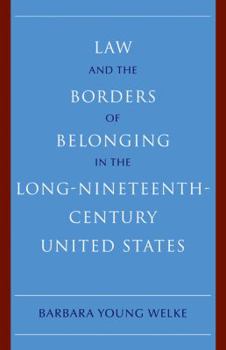Law and the Borders of Belonging in the Long-Ninteenth-Century United States
(Part of the New Histories of American Law Series)
Select Format
Select Condition 
Book Overview
For more than a generation, historians and legal scholars have documented inequalities at the heart of American law and daily life and exposed inconsistencies in the generic category of 'American citizenship'. Welke draws on that wealth of historical, legal, and theoretical scholarship to offer a new paradigm of liberal selfhood and citizenship from the founding of the United States through the 1920s. Law and the Borders of Belonging in the Long Nineteenth Century United States questions understanding this period through a progressive narrative of expanding rights, revealing that it was characterized instead by a sustained commitment to borders of belonging of liberal selfhood, citizenship, and nation in which able white men's privilege depended on the subject status of disabled persons, racialized others, and women. Welke's conclusions pose challenging questions about the modern liberal democratic state that extend well beyond the temporal and geographic boundaries of the long-nineteenth-century United States.
Format:Paperback
Language:English
ISBN:0521152259
ISBN13:9780521152259
Release Date:March 2010
Publisher:Cambridge University Press
Length:256 Pages
Weight:0.70 lbs.
Dimensions:0.6" x 5.5" x 8.4"
Customer Reviews
0 rating





